Yesterday, I received an email declaring that I and my colleague Dr. Ola Leifler had gotten our most recent scientific article published in the International Journal of Sustainability in Higher Education, with the title Curriculum integration of sustainability in engineering education – a national study of programme director perspectives.
Every publication day is a celebration day!
I have presented the findings from this study on several occasions in both national and international conferences, and in this blog post I will be summarising the most important results. I believe those could be of quite significant importance to policy makers and decision makers on various levels in higher education, and specifically in engineering education – naturally in Sweden since this is a national study, but indeed the findings also have broader implication.
BIG THANKS to all respondents who participated in this study!
Background to the study
Since of 2006, all higher education institutions (HEIs) in Sweden are enforced to, “in the course of their operations, […] promote sustainable development to assure for present and future generations a sound and healthy environment, economic and social welfare, and justice” (The Swedish Higher Education Act, Chapter 1, Section 5). This means, among other things, that sustainability must be integrated in higher education. Details on how this must be performed for acquiring and maintaining accreditation to issues HE degrees is specified in The Higher Education Ordinance, Annex 2.
In order to evaluate to which extent HEIs meet the requirements of the law, the Swedish Higher Education Authority (UKÄ) performed an evaluation in 2017 on the work of universities and colleges in promoting sustainable development. It was found that three quarters (!) of the higher education institutions are deemed to need to develop their processes in this area. In other words: they fail to meet the requirements in the law!
With this study, we wanted to further explore on those results of UKÄ’s evaluation with a more detailed account, especially for engineering education. We believe that the results are mostly generalisable and of interest to an international audience.
The research questions of the study
Programme directors are key stakeholders for integrating sustainability in education. In this study, we wanted to learn about their perspectives on integrating sustainability in the education programmes they are responsible for.
Specifically, we were curious about the following questions, specifically for engineering education:
- To what extent do programme directors in engineering education possess a deep understanding of the subject of sustainable development?
- Which are the core competencies in sustainable development that programme directors identify as important for their engineering students to acquire during their basic training?
- To what extent are those competencies integrated into engineering education today and what kind of support do programme directors receive from their department to integrate these competencies into the curriculum?
Arguably, teaching sustainability is difficult indeed! But it is also crucial, in order to realign education – and in the longer term, society – for the challenges our global society faces today and tomorrow.
How the study was performed
We addressed all 244 programme directors in Sweden that are responsible for one (and in some cases several) engineering programme(s) on Bachelor or Master level. Following up emails with several phone calls showed to be an extremely efficient method for reaching this community, and in the end, we gotten no less than 89 respondents! This corresponds to a response rate of 34%. We had a broad representation of the engineering spectrum (from mechanical engineering to computer science, chemical science and biotechnology etc.). Each respondent answered an online survey and, in some cases, we followed up with clarifying interviews.
The most important results
I present eight results in this blog post. We present results associated with Bachelor programmes (3YP), Master programmes (5YP) and summarised (3/5YP) separately.
The first result determines what programme directors in engineering education associate with the concept ‘sustainable development’, as an attempt to understand their level of understanding of this complex subject. In Results 1/8 it is evident that reference to the Brundtland report’s definition of sustainable development, the management of natural resources and a general reference to the three-pillar conception of sustainability (social, economic and environmental). Nothing surprising or controversial so far thus.
In Results 2/8 we see which of the United Nations’ Global Sustainable Development Goals (SDGs) that programme directors believe their students will acquire skills to address in the future. This is more interesting indeed, and wee see that SDGs associated with ‘traditional’ engineering skills (eg. energy, industry, innovation, infrastructure, production and in some cases climate change) are overrepresented. We do find this interesting since the we believe this may reveal a quite old-fashioned view on the engineering profession held by those responsible for renewing engineering education. We had hoped for a much more evenly distributed histogram that had better reflected the view that the SDGs are indeed indivisible and that engineers may be key candidates to become change agents for sustainability – able to address ALL OF THE SDGs on an system level.
We were also interested to learn what the progression of sustainability looked like through the programmes surveyed. In Results 3/8 we can see that there is a fairly good amount of introduction courses on sustainability but only a minority of the programmes follow up on those with progression throughout the programme. And to be honest: even if 60% of engineering programmes having at least an introduction module on sustainability is probably much higher than the corresponding fraction in many other disciplines, it is far from the goal of integrating sustainability in all engineering programmes. Another note on this relates to the concept of Virtual Course Plans for Sustainability Progression in Education Programmes, which I have reported on elsewhere. Perhaps there would be a need for a national programme to implement virtual course plans in engineering programmes?
In Results 4/8 it becomes increasingly obvious that even though sustainability is far from being a traditional subject it is often taught as any other traditional subject. Sustainability is intrinsically complex, interdisciplinary, being a subject of values and it needs a systems perspective to be truly understood. Innovative forms of teaching and learning such as active learning seminars, classroom games, role plays and so on do exist, but apparently many engineering programmes seem to be in desperate need of updates on the matter of the forms by which these issues are taught and learnt.
Note: red frames indicate ‘traditional teaching activities’, green frames indicate innovative teaching activities for which there is support in scientific literature of being effective in delivering sustainability education; yellow frames indicate teaching activities that can take both ‘traditional’ and ‘innovative’ forms and which therefore are difficult to evaluate.
One hunch that we had before we performed the study – that showed to be completely wrong – was that there might be some resistance among senior lecturers and programme directors against deep integration of sustainability in engineering education. However, as shown in Results 5/8 we could conclude that an overwhelming majority of programme directors saw very clear connections between the sustainability concept and their own subject. Instead, they reported that the most important challenge to overcome would be the lack of competence among the teaching staff to deliver sustainability education.
This picture became even clearer when analysing Results 6/8, where programme directors were asked to report on what motivate them personally to integrate sustainability in education. To our great satisfaction we could conclude that the main driver for integrating sustainability in education is the personal conviction of programme directors that this is actually important to do! We were very surprised over this being such a strong driver indeed, and that the legislative drivers were relatively weak (even though they were not weak on an absolute scale).
Results 7/8 and Results 8/8 respectively show to what extent programme directors feel they get the support they need from university management, and to what extent they believe that support is important.
Where do we go from here?
The general conclusion is that programme directors see teacher training for sustainability education as the most important lever to make real change – and that they feel that universities are not providing that to a sufficient extent.
Since I have personally been engaged with teacher training for sustainability education for almost a decade, I strongly agree with the opinion of this being of uttermost importance. This is also why I have done my best to develop, deliver and promote such teacher training courses both formerly as a lecturer at the Royal Institute of Technology (KTH) and today at Snowflake Education where we offer a teacher training programme that is absolutely game changing for those who take it.
This study was indeed very rewarding to perform. It confirmed some intuitions about sustainability education that we had before but it also challenged our own believes on a few points. It definitely gives me further confidence in promoting active learning with education games and flipped classroom as efficient ways to integrate sustainable development in education. And it certainly provides arguments when I promote the teacher training programme that I am proudly able to offer to those educators in need of further building their competence and confidence.

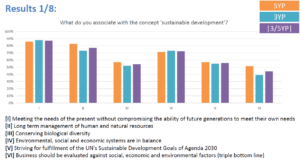
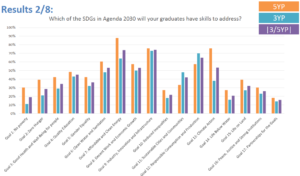
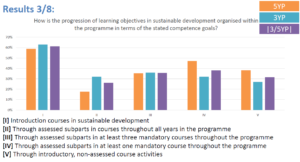
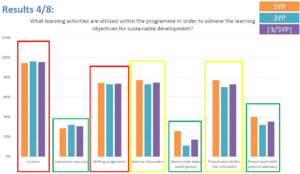
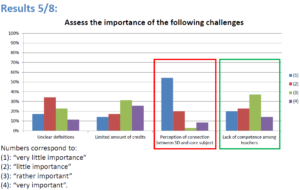
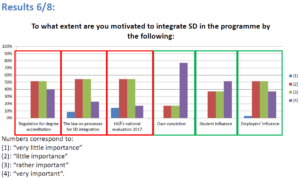
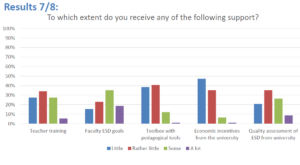
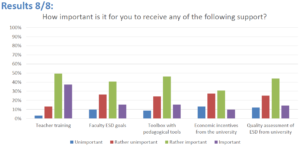
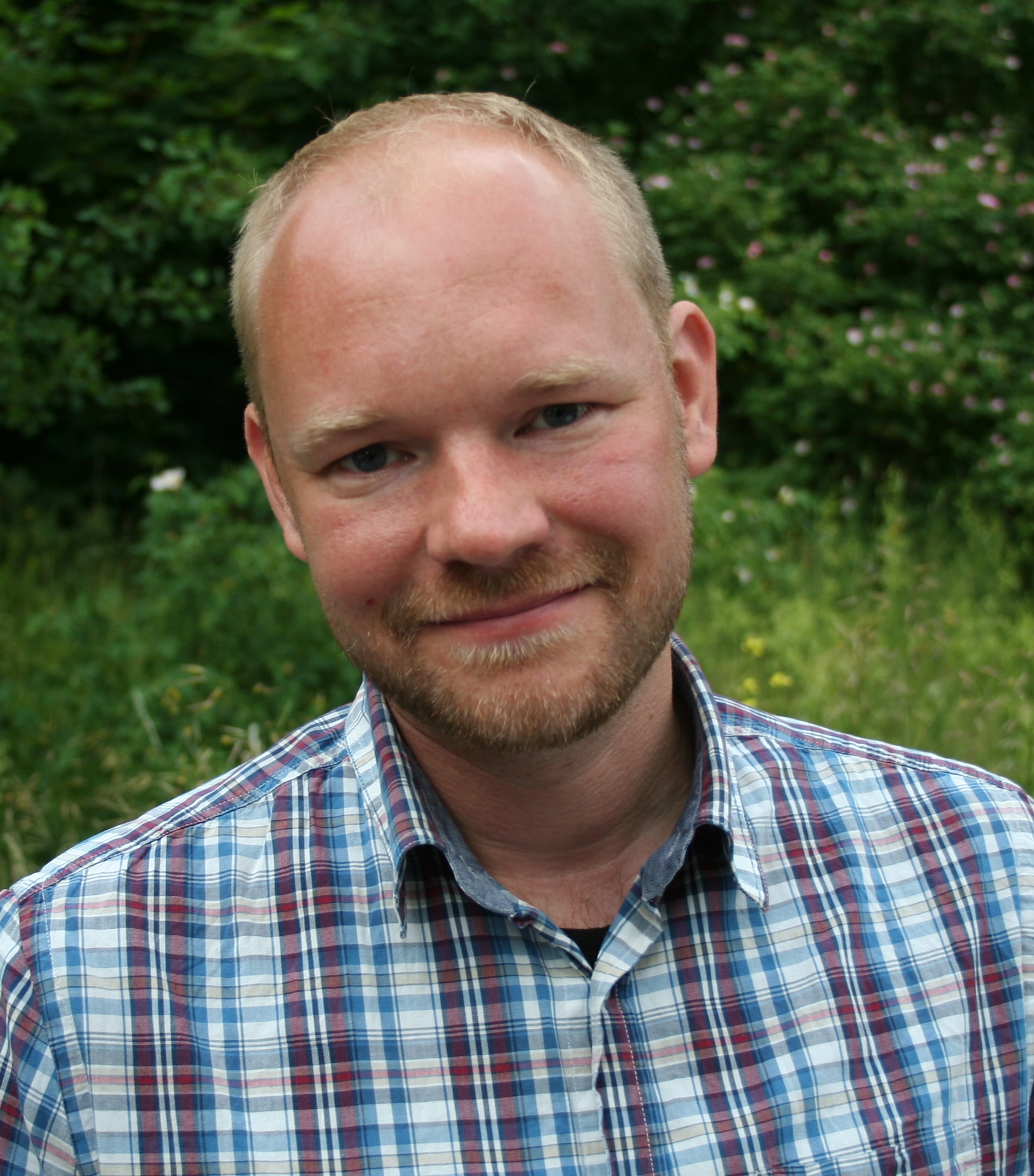
Hi Jon-Erik,
Thank you for posting your research. One of my students did a similar study a few years back – which I should push him further to publish beyond the conference paper we produced. Our study confirmed identical results to yours from engineering educators in Australian universities. Self motivation was the big driver for sustainability education development and lack of focus by Universities on sustainability education and lack of training in sustainability education the biggest barriers. I think our sample size was about 25 senior academics.
Thank you Michele, that is a very interesting note! It would be very interesting to see the results and I hope that you manage to go forward and publish.